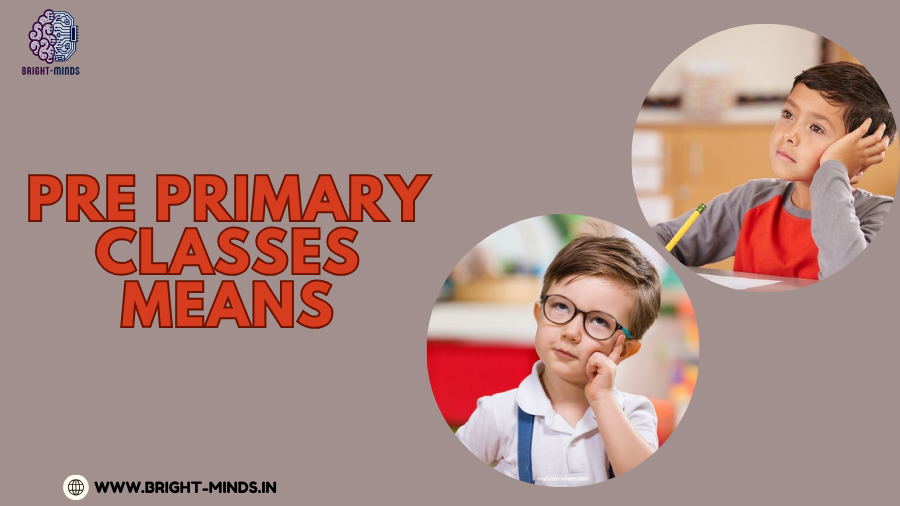Pre primary classes mean early childhood education that fosters holistic development through play, socialization, and foundational learning activities
The early years of a child’s life are a critical time for development. This is when their brains are like sponges, absorbing information and forming the foundation for future learning. Pre-primary classes, also sometimes called preschool or kindergarten programs, play a vital role in nurturing this development during the ages of 3 to 5.
What Are Pre Primary Classes?
Pre-primary classes are educational programs designed specifically for young children before they enter formal primary school. These classes offer a stimulating and nurturing environment where children can learn, grow, and develop essential skills through play-based activities, exploration, and social interaction.
What Happens in Pre Primary Classes?
Pre-primary curriculums vary, but they typically focus on the following key areas:
- Social and Emotional Development: Pre-primary classes help children learn to share, cooperate, take turns, and resolve conflicts peacefully. They also provide opportunities for children to develop self-confidence and build positive relationships with peers and teachers.
- Cognitive Development: Through play and exploration, children learn basic concepts like shapes, colors, numbers, and letters. They also develop problem-solving skills, critical thinking skills, and a love for learning.
- Language Development: Pre-primary classes provide a rich environment for language development. Children are exposed to new vocabulary, learn to communicate effectively, and begin to develop early literacy skills.
- Physical Development: Pre-primary classes provide opportunities for children to develop gross motor skills (large muscle movements) and fine motor skills (small muscle movements). Activities like singing, dancing, playing games, and using art materials all contribute to physical development.
The Benefits of Pre Primary Classes
There are numerous benefits associated with enrolling your child in pre-primary classes. Here are just a few:
- Improved Academic Performance: Studies have shown that children who attend pre-primary classes tend to perform better in school later on. They are better prepared to learn and have a stronger foundation in basic skills.
- Enhanced Social Skills:Pre Primary Classes help children develop important social skills like communication, cooperation, and conflict resolution. These skills are essential for success in school and throughout life.
- Increased Confidence: Pre Primary Classes provide a safe and supportive environment where children can learn and explore at their own pace. This can help children develop a sense of self-confidence and a love for learning.
- Improved Emotional Development:Pre Primary Classes help children learn to manage their emotions, express themselves effectively, and develop positive relationships with others.
- Better Preparation for Primary School: Pre Primary Classes help children become familiar with a school setting, learn routines, and develop the skills they need to succeed in primary school.
Is Pre-Primary Right for My Child?
Pre-primary classes are not mandatory, but they can be a valuable investment in your child’s future. Here are some factors to consider when deciding if pre-primary is right for your child:
- Your Child’s Age: Most pre-primary programs are designed for children between the ages of 3 and 5.
- Your Child’s Individual Needs: Some children may benefit more from pre-primary than others. Consider your child’s social skills, level of development, and temperament.
- Your Family’s Needs: Think about your work schedule and childcare arrangements. Pre-primary can provide a structured learning environment for children while parents are working.
Choosing a Pre Primary Class
There are many different types of Pre Primary Classes programs available, including public school programs, private preschools, and Montessori schools. When choosing a program, consider the following factors:
- Curriculum: Does the program align with your educational philosophy and your child’s needs?
- Class Size and Teacher-to-Student Ratio: Smaller class sizes and lower teacher-to-student ratios allow for more individualized attention.
- Facilities and Resources: Does the program have a safe and stimulating learning environment with appropriate resources for young children?
- Cost: The cost of pre-primary programs can vary depending on the type of program and location.
Conclusion
Pre Primary Classes offer a valuable opportunity for young children to learn, grow, and develop essential skills in a safe and nurturing environment. By enrolling your child in a pre-primary program, you can set them on the path to success in school and throughout life.
ou may be interested in this blog here:-
Understanding SAP S/4HANA Overview Key Features and Benefits
AI-Powered CRM Tools Driven by 2024 | Ayoshya Technologies..
How is SAP helping organizations with their digital transformation?

